Related Research Articles
Gary Ronnie Stewart was an American musician and songwriter, known for his distinctive vibrato voice and his outlaw country sound influenced by southern rock. At the height of his popularity in the mid-1970s, Time magazine described him as the "king of honkytonk." He had a series of country chart hits from the mid- to late 1970s, the biggest of which was "She's Actin' Single ", which topped the U.S. country singles chart in 1975.
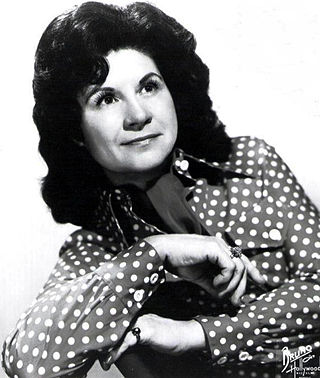
Ellen Muriel Deason, known professionally as Kitty Wells, was an American pioneering female country music singer. She broke down a barrier for women in country music with her 1952 hit recording "It Wasn't God Who Made Honky Tonk Angels", which also made her the first female country singer to top the U.S. country charts and turned her into the first female country superstar. “It Wasn’t God Who Made Honky Tonk Angels” would also be her first of several pop crossover hits. Wells is the only artist to be awarded top female vocalist awards for 14 consecutive years. Her chart-topping hits continued until the mid-1960s, paving the way for and inspiring a long list of female country singers who came to prominence in the 1960s.

Michael Webb Pierce was an American honky-tonk vocalist, songwriter and guitarist of the 1950s, one of the most popular of the genre, charting more number one hits than any other country artist during the decade.
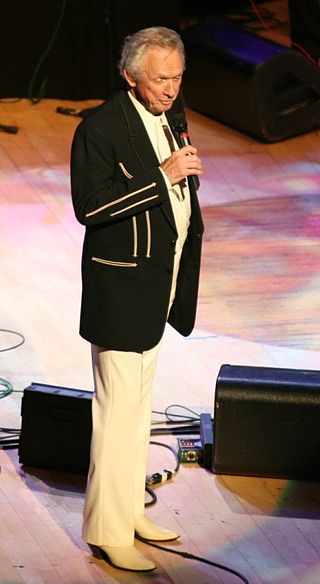
Lonnie Melvin Tillis was an American country music singer and songwriter. Although he recorded songs since the late 1950s, his biggest success occurred in the 1970s as part of the outlaw country movement, with a long list of Top 10 hits.

"So Wrong" is a song written by Carl Perkins, Danny Dill and Mel Tillis and popularized by country music artist Patsy Cline. The song was released as a single on Decca Records in 1962 by Patsy Cline.
"City Lights" is an American country music song written by Bill Anderson on August 27, 1957. He recorded it on a small Texas label called TNT Records in early 1958 to little acclaim. The song was first cut by Anderson in 1957 at the campus of the University of Georgia. In June 1958, Ray Price recorded it and his version hit number 1 on the Billboard Hot Country Songs singles chart in August 1958. Mickey Gilley's version also hit number 1 in June 1975.
"I Ain't Never" is a song co-written by American country music artists Webb Pierce and Mel Tillis. Each co-writer recorded the song separately, with both Pierce's (1959), and years later Tillis's (1972), versions resulting in major hits.
Daniel "Dude" Mowrey is an American country music artist. Between 1991 and 1993, Mowrey recorded two studio albums, both on major labels: 1991's Honky Tonk on Capitol Records Nashville, and 1993's Dude Mowrey on Arista Nashville. These albums produced four singles for Mowrey on the Hot Country Songs charts. The first of these, "Cowboys Don't Cry", was later a Top 40 hit when Daron Norwood recorded it for his debut album three years after Mowrey's version. Another cut, "Fallin' Never Felt So Good", was later recorded by both Shawn Camp and Mark Chesnutt.

"Why Baby Why" is a country music song co-written and originally recorded by George Jones. Released in late 1955 on Starday Records and produced by Starday co-founder and Jones' manager Pappy Daily, it peaked at 4 on the Billboard country charts that year. It was Jones' first chart single, following several unsuccessful singles released during the prior year on Starday.
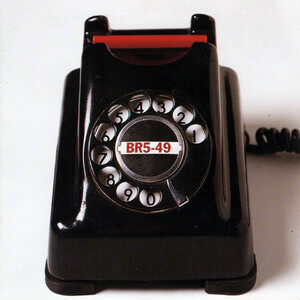
BR5-49 is the self-titled debut studio album of the American country rock band BR5-49. The album was released in 1996 on the Arista Nashville label. Three singles were released from the album, all of which charted on the Billboard Hot Country Singles & Tracks charts. "Cherokee Boogie", the first of these three, was the highest charting, reaching #44. Following it were "Even If It's Wrong" at #68 and "Little Ramona " at #61.
Honey (Open That Door)" is a song written by Mel Tillis and recorded by American country music artist Webb Pierce and by Ricky Skaggs. Pierce recorded it for his 1962 album Hideaway Heart. It was also a non-charted single by Pierce released in 1974.
I Get Lonely in a Hurry is an album by George Jones, released on United Artists Records in 1964.
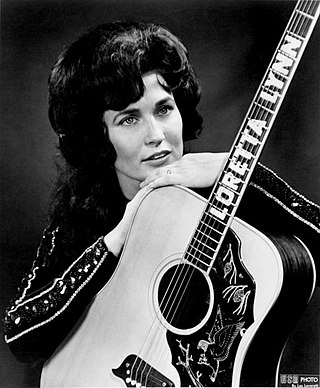
The discography of American country music singer-songwriter Loretta Lynn includes 50 studio albums, 36 compilation albums, two live albums, seven video albums, two box sets and 27 additional album appearances. Briefly recording with the Zero label, she signed an official recording contract with Decca Records in 1961, remaining there for over 20 years The first under the label was her debut studio album Loretta Lynn Sings (1963). It peaked at number two on the Billboard Top Country Albums survey. Lynn would issue several albums a year with her growing success, including a duet album with Ernest Tubb (1965), a gospel album (1965), and a holiday album (1966). Her seventh studio album You Ain't Woman Enough (1966) was her first release to top the country albums chart and to chart within the Billboard 200. Other albums to reach number one during this period were Don't Come Home a Drinkin' (1967) and Fist City. Don't Come A'Drinkin would also become Lynn's first album to certify gold by the Recording Industry Association of America (RIAA).
"Missing You" is a song written by Red Sovine and Dale Noe, which was originally released by Red Sovine in 1955, and was later a hit single for Webb Pierce in 1957, Ray Peterson in 1961, and was posthumously a hit for Jim Reeves in 1972. Sovine's version was the B-side of Red Sovine and Webb Pierce's hit single "Why Baby Why".
"Even Tho" is a country music song recorded by Webb Pierce. The song was co-written by Pierce, Willie Jones, and Curt Peeples. It was released in 1954 on the Decca label.

Queen of Honky Tonk Street is an album recorded by Kitty Wells and released in 1967 on the Decca label in the United States and on the Calendar Records label (SR66-9640) in Australia.
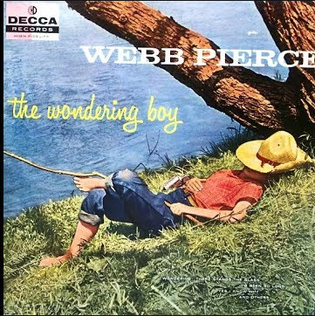
The Wondering Boy is an album from honky-tonk singer Webb Pierce that was released in August 1956 on the Decca label. Stephen Thomas Erlewine of AllMusic called the album "one of his best albums of the '50s" with a "dynamite" track sequence.

The Webb Pierce Story is a double album of the greatest hits of Webb Pierce. It was released in 1964 on the Decca label. It reached No. 13 on the Billboard country albums chart. The tracks are mostly re-recorded versions in stereo.

Webb! is an album by Webb Pierce that was released in 1959 on the Decca label. He was accompanied on the album by Owen Bradley and His Orchestra. Stephen Cook of AllMusic noted: "Topped off with Owen Bradley's clean musical backing, Webb! is a rare gem from the days before Pierce and his honky tonk kind were squeezed out by crossover country's arrival on the scene."
References
- 1 2 Joel Whitburn (1996). The Billboard Book of Top 40 Country Hits. Billboard Books. p. 245. ISBN 0823076326.
- ↑ "King of the Honky-Tonk: From the Original Master Tapes". AllMusic. Retrieved November 30, 2020.
- ↑ "20th Century Masters - The Millennium Collection: The Best of Webb Pierce". AllMusic. Retrieved November 30, 2020.
- ↑ "Caught in the Webb: A Tribute to the Legendary Webb Pierce". AllMusic. Retrieved November 30, 2020.